Opinion: Why We Need a National Monument to Reconstruction
(NY Times) Although Americans are already looking ahead to the next presidential administration, President Obama retains the power to shape his legacy and our nation in his remaining weeks in office. He has already used his final months to create several national monuments, and we urge him to create another, one that will speak as much to the nation’s present and future as it does to its past: the first national monument dedicated to Reconstruction — the turbulent, misunderstood era after the Civil War — in Beaufort, S.C., which has one of the country’s highest concentrations of Reconstruction-related sites.
Work on the monument is already underway. Community leaders in Beaufort have submitted a formal request to the National Park Service for a monument that encompasses key sites of emancipation and postwar community-building. In May, two South Carolina representatives — James Clyburn, a Democrat, and Mark Sanford, a Republican — sponsored a resolution to establish a national monument to the Reconstruction era. And last month, a group of 17 historians who have been helping the National Park Service study Reconstruction, as well as the American Historical Association and other professional historical groups, endorsed this effort.
Reconstruction was the nation’s first great experiment in biracial democracy. (read more)
Jeanette Epps: NASA names first black astronaut for space station crew
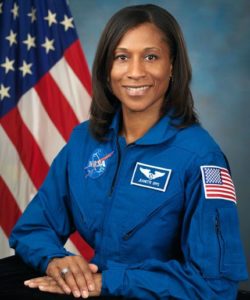 NASA is assigning veteran astronaut Andrew Feustel and first-flight astronaut Jeanette Epps (click for bio) to missions aboard the International Space Station in 2018.
NASA is assigning veteran astronaut Andrew Feustel and first-flight astronaut Jeanette Epps (click for bio) to missions aboard the International Space Station in 2018.
Feustel will launch in March 2018 for his first long-duration mission, serving as a flight engineer on Expedition 55, and later as commander of Expedition 56. Epps, a native of Syracuse, N.Y., will become the first African American space station crew member when she launches on her first spaceflight in May 2018. She’ll join Feustel as a flight engineer on Expedition 56, and remain on board for Expedition 57.
“Each space station crew brings something different to the table, and Drew and Jeanette both have a lot to offer,” said Chris Cassidy, chief of the Astronaut Office at NASA’s Johnson Space Center in Houston. “The space station will benefit from having them on board.”
Epps has a Ph.D. in aerospace engineering from the University of Maryland. She speaks Russian, which will be handy when working alongside Russian cosmonauts on the space station. She is a former CIA technical intelligence officer who previously worked at Ford Motor Co. as a technical specialist in the company’s scientific research lab. Her research in magnetostrictive actuators and automobile collision location detection and countermeasure systems resulted in patents. (read more)
Literary: Prize-winning book chronicles history of racist thinking
(Associated Press)
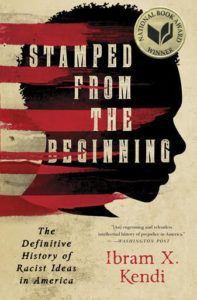 “Stamped from the Beginning,” winner of the National Book Award winner for nonfiction, is a work of history very much rooted in recent events.
“Stamped from the Beginning,” winner of the National Book Award winner for nonfiction, is a work of history very much rooted in recent events.
Ibram X. Kendi’s 600-page narrative traces the origins and justifications for racism in the U.S. from colonial times to the present. Kendi began working on the book shortly before the killing of Trayvon Martin in 2012, and he felt a special urgency to write about what he calls “stimulations,” individuals “who believe that black people were culturally or behaviorally inferior.”
“There are notions that scientists, and journalists, and scholars can be objective,” he says. “And typically those ideas that have connoted that black people are in some ways inferior have been cast as these objective ideas, which then legitimize them and allowed for their circulation.”
Kendi, an assistant professor of African American History at the University of Florida, structured “Stamped from the Beginning” around five people, ranging from Thomas Jefferson to Angela Davis, and around the efforts to combat racism, whether the self-help ethic of Booker T. Washington or the moral persuasion of the Rev. Martin Luther King Jr.
The book’s title comes from a speech by Jefferson Davis, given the year before he became president of the Confederate states: “This country was created by white men for white men, and inequality between the white and black races was stamped from the beginning,” Davis said. (read more)
Umbra Search African American History makes Black History freely available
 The University of Minnesota Libraries, in partnership with the Penumbra Theatre Company, is launching Umbra Search African American History, a free and openly available online search tool at www.umbrasearch.org that facilitates broad access to over 400,000 digitized archival materials documenting African American history from more than 1,000 libraries, archives, and cultural heritage institutions across the United States.
The University of Minnesota Libraries, in partnership with the Penumbra Theatre Company, is launching Umbra Search African American History, a free and openly available online search tool at www.umbrasearch.org that facilitates broad access to over 400,000 digitized archival materials documenting African American history from more than 1,000 libraries, archives, and cultural heritage institutions across the United States.
“Now out of its beta and testing phase, Umbra Search builds a national corpus of African American works,” said director Cecily Marcus. “No library is able to digitize all of its holdings, but by bringing together materials from all over the country, Umbra Search allows students and scholars to tell stories that have never been told before. Umbra Search partners have amazing collections, and now those materials can sit side by side with related content from a library on the other side of the country.”
With a growing user base of more than 55,000, Umbra Search African American History features materials that touch every subject and discipline, show every part of the country, and feature everything from music to oral histories to photographs, maps, handwritten letters, and much more. (read more)
Donald Trump and black colleges are getting to know each other
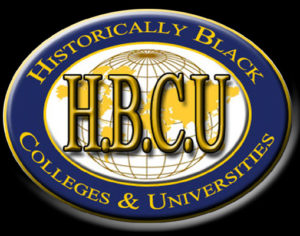 (The Telegraph) What does President-elect Donald Trump know about historically black colleges and universities?
(The Telegraph) What does President-elect Donald Trump know about historically black colleges and universities?
That’s what leaders and advocates of the nation’s HBCUs, the common shorthand for historically black schools, have been trying to figure out since Trump’s surprising victory in November’s presidential election.
“What are the priorities for HBCUs in the new administration? I don’t know,” said Ronald Carter, president of Johnson C. Smith University, a four-year private HBCU in Charlotte, North Carolina. “I think it’s a bit premature to try to guess or deduce what he’ll do and what the priorities will be for higher education in general and historically black colleges and universities in particular.”
But it appears that the incoming 45th president is trying to learn as much about black colleges as the institutions are trying to learn about his level of his commitment to funding and supporting their campuses. HBCUs are any black college or university established before 1964 with the principal mission of educating African-Americans.
HBCU officials and Trump advisers have been huddling, having discussions that some participants describe as listening sessions and sales pitches for the incoming administration to heavily invest in the 100-plus HBCU campuses, which are home to about 300,000 students. (read more)
TIPHC Bookshelf
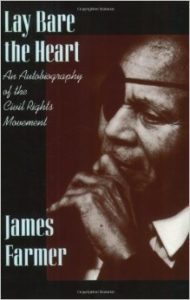 Published scholarship on black history in Texas is growing and we’d like to share with you some suggested readings, both current and past, from some of the preeminent history scholars in Texas and beyond. We invite you to take a look at our bookshelf page — including a featured selection — and check back as the list grows. A different selection will be featured each week. We welcome suggestions and reviews. This week, we offer, “Lay Bare the Heart, An Autobiography of the Civil Rights Movement,” by James Farmer.
Published scholarship on black history in Texas is growing and we’d like to share with you some suggested readings, both current and past, from some of the preeminent history scholars in Texas and beyond. We invite you to take a look at our bookshelf page — including a featured selection — and check back as the list grows. A different selection will be featured each week. We welcome suggestions and reviews. This week, we offer, “Lay Bare the Heart, An Autobiography of the Civil Rights Movement,” by James Farmer.
Texas native James Farmer is one of the “Big Four” of the turbulent 1960s civil rights movement, along with Martin Luther King Jr., Roy Wilkins, and Whitney Young. Farmer might be called the forgotten man of the movement, overshadowed by Martin Luther King Jr., who was deeply influenced by Farmer’s interpretation of Gandhi’s concept of nonviolent protest.
Born in Marshall, Texas, in 1920, the son of a preacher, Farmer grew up with segregated movie theaters and “White Only” drinking fountains. This background impelled him to found the Congress of Racial Equality in 1942. That same year he mobilized the first sit-in in an all-white restaurant near the University of Chicago. Under Farmer’s direction, CORE set the pattern for the civil rights movement by peaceful protests which eventually led to the dramatic “Freedom Rides” of the 1960s.
In Lay Bare the Heart Farmer tells the story of the heroic civil rights struggle of the 1950s and 1960s. This moving and unsparing personal account captures both the inspiring strengths and human weaknesses of a movement beset by rivalries, conflicts and betrayals. Farmer recalls meetings with Franklin and Eleanor Roosevelt, Jack and Bobby Kennedy, Adlai Stevenson (for whom he had great respect), and Lyndon Johnson (who, according to Farmer, used Adam Clayton Powell Jr., to thwart a major phase of the movement).
James Farmer has courageously worked for dignity for all people in the United States. In this book, he tells his story with forthright honesty.
First published in 1985 by Arbor House, this edition contains a new foreword by Don Carleton, director of the Dolph Briscoe Center for American History at the University of Texas at Austin, and a new preface.
This Week In Texas Black History, Jan. 8-14
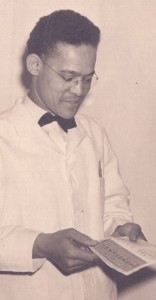 8 – Theodore Roosevelt Youngblood, Sr. was born on this day in 1903 in Limestone County (east of Waco). Youngblood was a civic leader and headwaiter at the Driskill Hotel and Stephen F. Austin hotels in Austin. He received a bachelor of arts degree in history in 1927 from Samuel Huston College (now Huston-Tillotson University), however, his employment opportunities were limited to jobs such as porter at the Capitol and waiter at Austin hotels. He served as headwaiter at the Driskill and the Stephen F. Austin Hotel from the 1930s until his retirement in 1968. At those hotels, he put together and served receptions, dinner parties, and meetings for prominent white politicians, businessmen, educators, and cattlemen for the Austin area and the state of Texas including President Lyndon B. Johnson and governors Dolph Briscoe, John Connally, and Allan Shivers. Youngblood was chairman of the Negro Chamber of Commerce and president of the Huston College alumni association. He also entertained at his home many well-known black leaders such as NAACP attorney Thurgood Marshall. Youngblood died on February 9, 1993, at age 90.
8 – Theodore Roosevelt Youngblood, Sr. was born on this day in 1903 in Limestone County (east of Waco). Youngblood was a civic leader and headwaiter at the Driskill Hotel and Stephen F. Austin hotels in Austin. He received a bachelor of arts degree in history in 1927 from Samuel Huston College (now Huston-Tillotson University), however, his employment opportunities were limited to jobs such as porter at the Capitol and waiter at Austin hotels. He served as headwaiter at the Driskill and the Stephen F. Austin Hotel from the 1930s until his retirement in 1968. At those hotels, he put together and served receptions, dinner parties, and meetings for prominent white politicians, businessmen, educators, and cattlemen for the Austin area and the state of Texas including President Lyndon B. Johnson and governors Dolph Briscoe, John Connally, and Allan Shivers. Youngblood was chairman of the Negro Chamber of Commerce and president of the Huston College alumni association. He also entertained at his home many well-known black leaders such as NAACP attorney Thurgood Marshall. Youngblood died on February 9, 1993, at age 90.
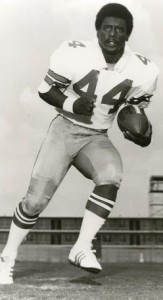 9 – On this date in 1950 Dallas Cowboys running back Robert Newhouse was born in Longview. He starred at Galilee High School in Hallsville, situated between Longview and Marshall. The University of Houston was the only major school recruiting offer he received and with the Cougars, from 1969-1971, Newhouse set several rushing records and left the school as its all-time single-season rushing leader with 1,757 yards as a senior. That total, at the time, was the second most rushing yards in a season in NCAA history and earned Newhouse second team All-American honors. He was a second round draft pick by the Cowboys in 1972 and played all of his 12 NFL seasons with Dallas. Newhouse led the team in rushing with 930 yards in 1975.
9 – On this date in 1950 Dallas Cowboys running back Robert Newhouse was born in Longview. He starred at Galilee High School in Hallsville, situated between Longview and Marshall. The University of Houston was the only major school recruiting offer he received and with the Cougars, from 1969-1971, Newhouse set several rushing records and left the school as its all-time single-season rushing leader with 1,757 yards as a senior. That total, at the time, was the second most rushing yards in a season in NCAA history and earned Newhouse second team All-American honors. He was a second round draft pick by the Cowboys in 1972 and played all of his 12 NFL seasons with Dallas. Newhouse led the team in rushing with 930 yards in 1975.
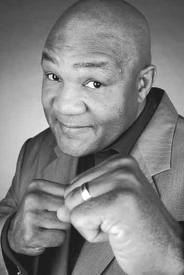 10 – On this day in 1949, heavyweight boxing champion and successful entrepreneur George Foreman was born in Marshall. Foreman, who would also become an ordained minister, went from being a street brawler in Houston’s Fifth Ward to the Job Corps program where he became a boxer and won a gold medal at the 1968 Summer Olympics in Mexico City. He won his first heavyweight crown when he defeated Joe Frazier in 1973, then at age 44, became the oldest fighter to win the crown when he defeated Michael Moorer in 1994. Following his boxing career, Foreman became a pitchman for the “George Foreman Lean Mean Fat-Reducing Grilling Machine,” which surpassed sales of 100 million. In 1999, Foreman Grill manufacturer Salton, Inc. paid Foreman $137.5 million in cash and stock for rights to his name and image in what some have called one of the greatest sports marketing deals in history. Foreman was inducted to the International Boxing Hall of Fame on June 8, 2003.
10 – On this day in 1949, heavyweight boxing champion and successful entrepreneur George Foreman was born in Marshall. Foreman, who would also become an ordained minister, went from being a street brawler in Houston’s Fifth Ward to the Job Corps program where he became a boxer and won a gold medal at the 1968 Summer Olympics in Mexico City. He won his first heavyweight crown when he defeated Joe Frazier in 1973, then at age 44, became the oldest fighter to win the crown when he defeated Michael Moorer in 1994. Following his boxing career, Foreman became a pitchman for the “George Foreman Lean Mean Fat-Reducing Grilling Machine,” which surpassed sales of 100 million. In 1999, Foreman Grill manufacturer Salton, Inc. paid Foreman $137.5 million in cash and stock for rights to his name and image in what some have called one of the greatest sports marketing deals in history. Foreman was inducted to the International Boxing Hall of Fame on June 8, 2003.
 10 – Teresa Graves, a singer and actress, was born on this day in Houston, in 1949. Graves was a regular on ”Rowan & Martin’s Laugh-In” comedy show in 1969 and 1970. She also starred in the television police drama “Get Christie Love” in 1974-75, making her the first African American woman to star in her own hour-long drama television series.
10 – Teresa Graves, a singer and actress, was born on this day in Houston, in 1949. Graves was a regular on ”Rowan & Martin’s Laugh-In” comedy show in 1969 and 1970. She also starred in the television police drama “Get Christie Love” in 1974-75, making her the first African American woman to star in her own hour-long drama television series.
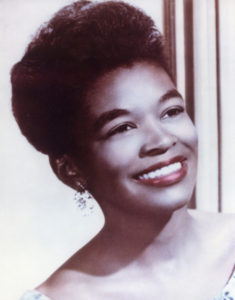 10 – Thelma Joyce White was born on this day in 1936 in Marlin. In March 1955, lawyers including the NAACP’s Thurgood Marshall, acting in her behalf filed suit in federal court seeking her admission to Texas Western College, part of the University of Texas System. Before White’s case, the law and medical schools and several graduate programs had been opened to blacks, but all undergraduate schools in Texas remained closed. White won the suit and blacks were admitted to TWC and other public universities in Texas. Ironically, White never attended the school, choosing instead to remain at nearby New Mexico A&M in Las Cruces where she had already begun studies.
10 – Thelma Joyce White was born on this day in 1936 in Marlin. In March 1955, lawyers including the NAACP’s Thurgood Marshall, acting in her behalf filed suit in federal court seeking her admission to Texas Western College, part of the University of Texas System. Before White’s case, the law and medical schools and several graduate programs had been opened to blacks, but all undergraduate schools in Texas remained closed. White won the suit and blacks were admitted to TWC and other public universities in Texas. Ironically, White never attended the school, choosing instead to remain at nearby New Mexico A&M in Las Cruces where she had already begun studies.
11 – On this day in 1945, Secretary of the Treasury Henry Morgenthau Jr., honored Houston’s Hugh McElroy for participating in bond drives as a speaker and poster model. McElroy was reportedly the first African American whose picture appeared as an advertisement for U.S. war bonds. At age 14, McElroy, a Kentucky native, lied about his his age and enlisted in the Tenth Cavalry. He served in Cuba in the Spanish-American War, in the Philippine Insurrection, and on Gen. John Pershing’s expedition into Mexico. Highly-decorated, McElroy retired in 1927 and settled in Houston.
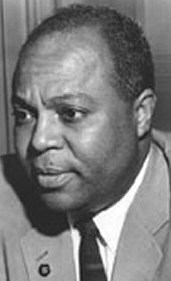 12 – Civil Rights activist James Farmer, Jr. was born on this day in 1920 in Marshall. A graduate of Wiley College, in 1942, Farmer co-founded and was national director of the Congress of Racial Equality which originated integrated bus trips through the South, called “Freedom Rides” to challenge local efforts to block the desegregation of interstate busing, and to support passage of Civil Rights and Voting Rights acts in the 1960s. As a result of CORE’s efforts, more than 100 Southern bus terminals were desegregated. In 1998, Farmer was awarded the Presidential Medal of Freedom. (See TIPHC Bookshelf for “Lay Bare the Heart, An Autobiography of the Civil Rights Movement.”)
12 – Civil Rights activist James Farmer, Jr. was born on this day in 1920 in Marshall. A graduate of Wiley College, in 1942, Farmer co-founded and was national director of the Congress of Racial Equality which originated integrated bus trips through the South, called “Freedom Rides” to challenge local efforts to block the desegregation of interstate busing, and to support passage of Civil Rights and Voting Rights acts in the 1960s. As a result of CORE’s efforts, more than 100 Southern bus terminals were desegregated. In 1998, Farmer was awarded the Presidential Medal of Freedom. (See TIPHC Bookshelf for “Lay Bare the Heart, An Autobiography of the Civil Rights Movement.”)
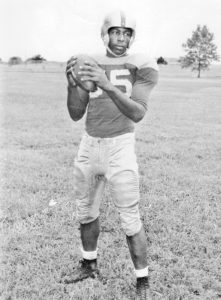 12 — Charlie “Choo Choo” Brackins was born this day in 1932 in Dallas. Brackins starred as a quarterback at Prairie View A&M, leading the Panthers to 33 wins in the 37 games he played from 1951 to 1955. In his brief (seven games) National Football League career, Brackins was a 16th round pick by the Green Bay Packers in the 1955 draft. On October 23,1955, Brackins played the final minutes of a game against the Cleveland Browns, making him the fourth black quarterback to play in an NFL game and the first player from an HBCU to play quarterback in the NFL. Brackins was voted to the Black College Football Hall of Fame with the 2013 class. He was a two-time Pittsburgh Courier All-American (1953 and 1954) and led PV to three Southwestern Athletic Conference championships (1952, 1953, 1954) and two Black College National Championships (1953 and 1954).
12 — Charlie “Choo Choo” Brackins was born this day in 1932 in Dallas. Brackins starred as a quarterback at Prairie View A&M, leading the Panthers to 33 wins in the 37 games he played from 1951 to 1955. In his brief (seven games) National Football League career, Brackins was a 16th round pick by the Green Bay Packers in the 1955 draft. On October 23,1955, Brackins played the final minutes of a game against the Cleveland Browns, making him the fourth black quarterback to play in an NFL game and the first player from an HBCU to play quarterback in the NFL. Brackins was voted to the Black College Football Hall of Fame with the 2013 class. He was a two-time Pittsburgh Courier All-American (1953 and 1954) and led PV to three Southwestern Athletic Conference championships (1952, 1953, 1954) and two Black College National Championships (1953 and 1954).
Blog: Ron Goodwin, author, PVAMU history professor
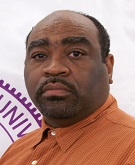 Ron Goodwin’s bi-weekly blog appears exclusively for TIPHC. Goodwin is a San Antonio native and Air Force veteran. Generally, his column addresses contemporary issues in the black community and how they relate to black history. He and the TIPHC staff welcome your comments.
Ron Goodwin’s bi-weekly blog appears exclusively for TIPHC. Goodwin is a San Antonio native and Air Force veteran. Generally, his column addresses contemporary issues in the black community and how they relate to black history. He and the TIPHC staff welcome your comments.
Read his latest entry, “Misc. musings,” here.
Submissions Wanted
Historians, scholars, students, lend us your…writings. Help us produce the most comprehensive documentation ever undertaken for the African American experience in Texas. We encourage you to contribute items about people, places, events, issues, politics/legislation, sports, entertainment, religion, etc., as general entries or essays. Our documentation is wide-ranging and diverse, and you may research and write about the subject of your interest or, to start, please consult our list of suggested biographical entries and see submission guidelines. However, all topics must be approved by TIPHC editors before beginning your research/writing.
We welcome your questions or comments via email or telephone – mdhurd@pvamu.edu.
